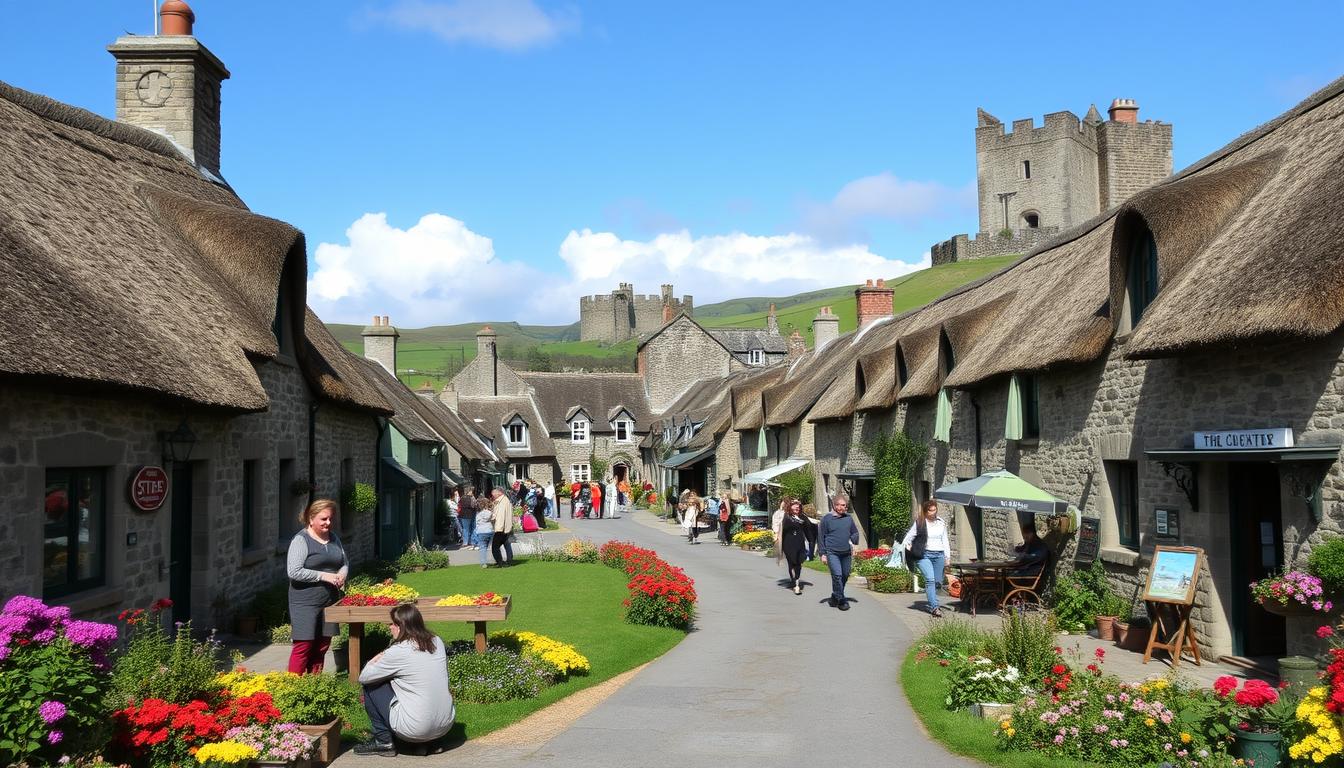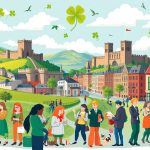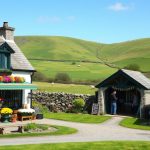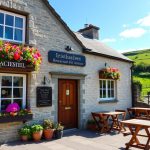In Ireland, community is a big part of daily life. It shapes the unique Irish culture. People feel a strong sense of belonging because of their social connections. These connections are built on shared values and traditions.
This section looks at how community life is shaped by these shared experiences. It shows the importance of cultural ties in Ireland. These ties help form the identity of modern Ireland.
Key Takeaways
- Community in Ireland plays a vital role in daily life and cultural expression.
- Social connections are essential for building a sense of belonging among individuals.
- Shared values and traditions form the foundation of Irish society.
- Understanding community dynamics enriches our perception of Irish culture.
- Cultural ties significantly shape the identity of modern Ireland.
The Essence of Community in Ireland
In Ireland, community life is all about family, support, and shared moments. These values make social ties strong and give people a deep sense of belonging. Neighbours help each other and celebrate together, building a place full of trust and friendship.
Talking in Irish or sharing local stories is key to keeping the Irish identity alive. It also brings people closer together. Folk tales and stories link different generations, making the community stronger.
Local traditions, like music and festivals, also play a big part. They help people meet and make new friends. Everyone comes together to celebrate their Irish roots and make new connections.
Being connected is especially important today. Communities offer support and help during tough times. In Ireland, the community shows how together, we can overcome anything. Shared experiences and achievements strengthen the bonds between people, showing a strong, united identity.
| Element | Description |
|---|---|
| Kinship | Strong family ties that enhance feelings of belonging. |
| Social Bonds | Connections formed through shared experiences and support. |
| Language | Use of Irish to strengthen cultural identity and unity. |
| Folklore | Stories that connect generations and reinforce community ties. |
| Traditions | Local customs that celebrate heritage and promote togetherness. |
Historical Roots of Irish Communities
The history of Irish communities goes back to ancient times. It shows a rich mix of cultural changes. Early settlers were influenced by the Norse and Norman invasions. These invasions added new elements to the Irish traditions.
The clan system was key in community life. It was based on shared ancestry and loyalty. This created a strong sense of belonging and helped people work together in hard times.
Agriculture was also crucial in shaping community life. People shared the land, which made them work together and rely on each other.
Historical events have deeply influenced Irish communities. The Great Famine in the mid-19th century was a sad time that changed the population and migration. It made many leave Ireland, and those who stayed faced big changes.
The fight for independence brought people together. It created a strong national pride and identity.
Today, the impact of these historical communities is still seen in our social structures and cultural practices. Learning about community evolution helps us understand modern Irish life. It shows how heritage is key to moving forward.
| Historical Event | Impact on Communities |
|---|---|
| The Great Famine | Population decline, increased emigration, and societal restructuring. |
| Norman Invasions | Introduction of new systems of governance and land ownership. |
| Independence Movement | Strengthened national identity and fostered community solidarity. |
Traditional Irish Festivals: Celebrating Culture and Connection
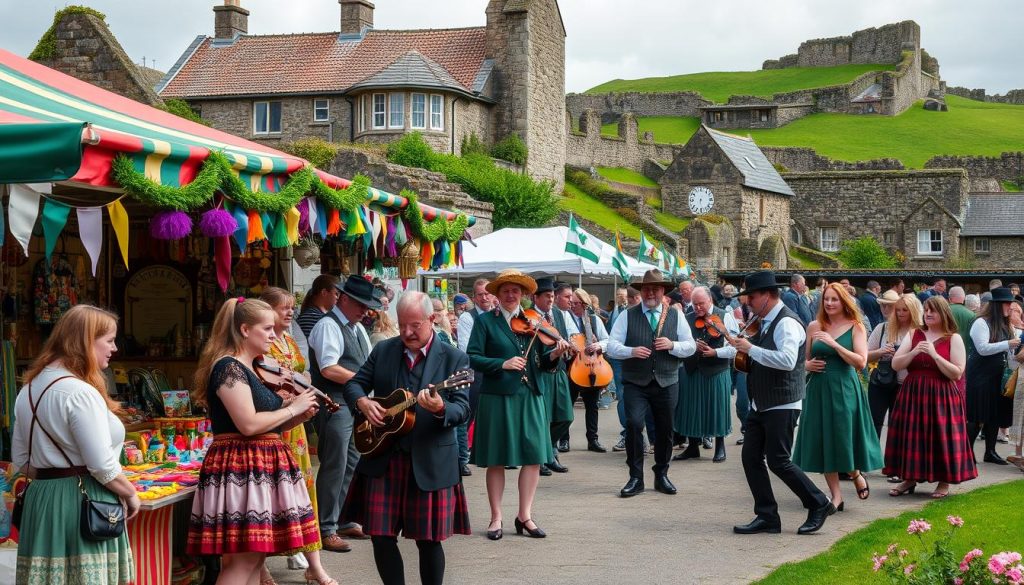
Traditional festivals are key in Ireland’s culture, bringing people together. Events like St. Patrick’s Day, Beltane, and Lughnasadh show off Ireland’s heritage and community spirit. They help people feel connected across generations.
St. Patrick’s Day parades fill streets with music and dance. Floats and people in green clothes make it a lively scene. It’s a day to celebrate Ireland’s folklore and build community bonds.
Beltane, on May Day, welcomes summer with bonfires and feasts. It’s a time to celebrate nature and farming. People of all ages join in, making it a fun event that strengthens community ties.
Lughnasadh honours the harvest with food, music, and games. It reminds us of farming’s hard work and the value of community. Traditional music and food fairs let people share their skills and stories, keeping culture alive.
These festivals do more than just entertain; they’re vital for community bonding. They offer a chance for people to come together, strengthening social connections and preserving cultural traditions.
Modern Community Initiatives in Ireland
Today, community initiatives in Ireland are key to building a stronger society. They work to make communities more inclusive and diverse. By tackling social issues, they help local people.
Non-profits, councils, and grassroots groups lead these efforts. They show a strong commitment to improving community life.
These projects bring people together, encouraging them to make a difference. With events, workshops, and outreach, people can connect and work on solutions. This helps everyone in the community.
The table below shows some key community projects, their goals, and who’s behind them:
| Community Initiative | Objectives | Organisations Involved |
|---|---|---|
| Community Arts Programme | Promote artistic expression among local youth | Local Arts Council, Community Centres |
| Neighbourhood Watch Scheme | Enhance safety and security in residential areas | Local Gardaí, Community Associations |
| Health and Well-Being Initiatives | Support mental health and wellness in communities | Health Service Executive, Non-profit Mental Health Charities |
| Environmental Clean-Up Drives | Encourage community involvement in preserving local environments | Environmental NGOs, Local Councils |
| Women’s Empowerment Workshops | Promote gender equality and support women’s rights | Local Women’s Groups, Non-profit Organisations |
These projects show the wide range of community work in Ireland. The landscape is always changing, with community efforts leading the way. This creates a more united and active society.
Community in Ireland: Rural vs. Urban Dynamics
In Ireland, rural and urban communities show big differences in lifestyle. These differences affect how people interact and build communities. Rural areas offer a unique way of life, with fewer people and easier access to services. Urban areas, on the other hand, have more people and better services.
As more people move to cities, rural life is changing. This brings new ways for communities to grow and change.
Contrasting Lifestyles in Different Settings
Rural communities are often close-knit, with strong family and social bonds. People meet often at local events, feeling a deep sense of belonging. Urban areas, however, have a more diverse population. This diversity brings different cultures together but can also make relationships less stable and community ties weaker.
| Aspect | Rural Communities | Urban Communities |
|---|---|---|
| Population Density | Low, often spread out | High, densely populated |
| Access to Services | Limited, fewer local amenities | Extensive, with many options |
| Economic Opportunities | Primarily agriculture and local businesses | Diverse industries and job markets |
| Social Interaction | Strong, frequent community engagement | Diverse, sometimes superficial connections |
Looking at rural and urban communities shows us the big differences in lifestyle. These differences highlight the importance of where we live in shaping our communities. As Ireland changes, so will the ways people interact and experience life in these different places.
The Role of Local Pubs in Irish Society
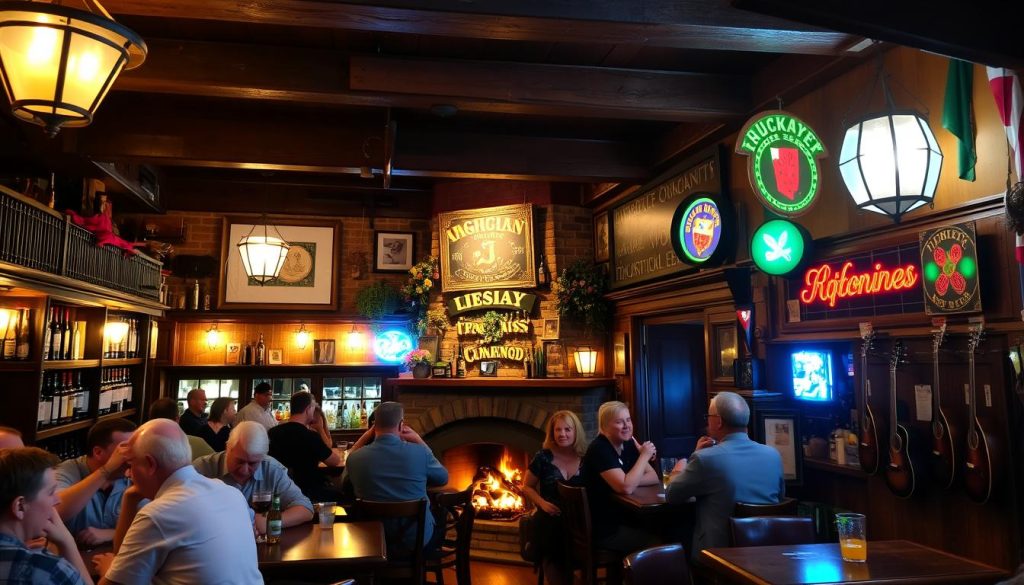
Local pubs in Ireland are key social spots in communities. They’re where people come together to share stories and make friends. These places are more than just for drinking; they’re lively spots for community bonding.
The vibe in pubs brings people close, showing off Irish culture. It’s a place where locals find comfort and enjoy various activities. Whether it’s celebrating, watching sports, or unwinding, pubs help people connect deeply.
These pubs are important for more than just fun. They host traditional music, stories, and events, keeping Irish culture alive. These activities bring people together and help the local economy too.
To sum up, local pubs are vital in Irish life. They’re where people bond, celebrate culture, and make strong connections with others.
The Influence of Family Values in Community Life
In Ireland, family values are key to community life. They create a strong sense of belonging and help everyone work together. Families build a strong base for society, teaching the importance of helping each other.
Grandparents and grandchildren are at the heart of this. They share stories and traditions, keeping culture alive. This sharing helps everyone grow and makes communities stronger.
Family events bring people closer together. Celebrations and simple meet-ups strengthen family bonds and community spirit. These values teach the importance of working together, which is key for a united community.
But family support goes beyond just their own circle. In Ireland, families often help out in their communities. This teamwork shows how family values shape society, making communities healthier and more united.
Art and Creativity: A Unifying Force in Communities
Art brings people together in Ireland, creating a strong bond. It comes in many forms like visual arts, music, and literature. These arts show the deep heritage and life of local people. They make everyone feel they belong, building a united culture.
Local groups work hard to support art in communities. They encourage people to join in and work together. Festivals like the Galway International Arts Festival are key for showing off talent and starting conversations.
Emerging artists play a big part too. They get support through workshops, shows, and public art. This helps them grow creatively and share their stories. By taking part, people boost their skills and help shape their community’s identity.
Here’s how different arts help bring communities together:
| Art Form | Community Benefits | Examples |
|---|---|---|
| Visual Arts | Fosters creativity and aesthetic appreciation | Mural projects, local galleries |
| Music | Encourages collaboration and emotional connectivity | Community choirs, folk music festivals |
| Literature | Promotes storytelling and cultural heritage | Book clubs, literary festivals |
Art and creativity are key to building strong community ties. They help people in Ireland find common ground. By sharing their stories and values, they keep making their culture richer.
Sports and Games: Building Bonds Among Locals
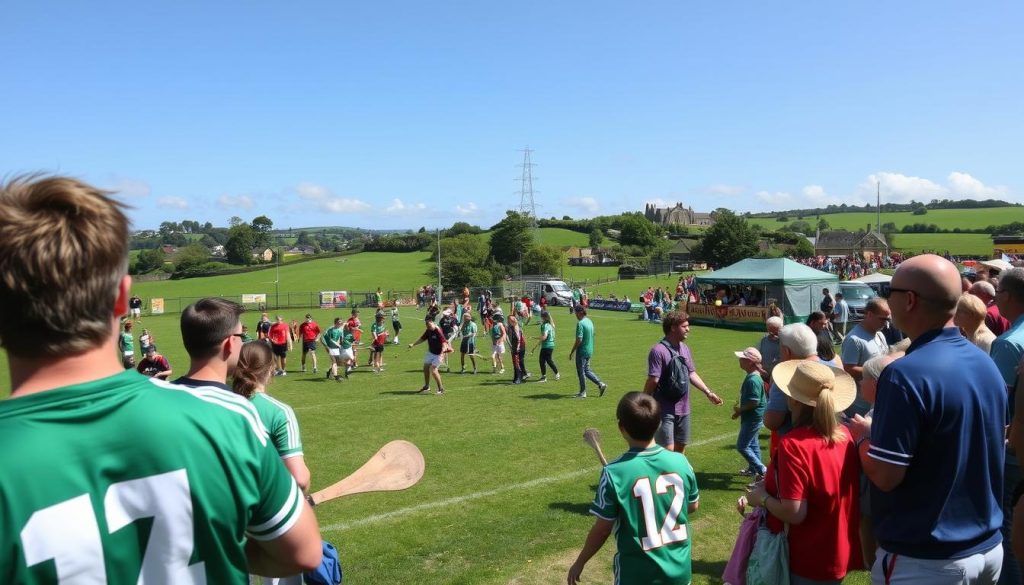
The vibrant sports culture in Ireland is key to bringing people together. It helps build community bonding and keeps locals connected. Events like hurling and Gaelic football are not just games; they’re ways to celebrate and support each other.
Playing local games like rugby and soccer brings out the competitive spirit. This spirit boosts community pride and gets more people involved. Clubs and groups for these sports create networks that strengthen ties among players and fans.
In Ireland, towns come alive as people support their teams. These events turn into family gatherings, bringing together people of all ages. This helps build strong family bonds and enriches community life. Here’s how some sports affect community engagement:
| Sport | Key Benefits | Local Engagement |
|---|---|---|
| Hurling | Teamwork, Tradition | Community events and festivals |
| Gaelic Football | Inclusivity, Skill development | Youth participation and training |
| Rugby | Discipline, Strategy | Club competitions and outreach programmes |
| Soccer | Health benefits, Social interactions | Local tournaments and leagues |
Sports play a huge part in community bonding. By joining in local games, people make lasting friends and feel they belong. This adds to Ireland’s rich cultural life.
Volunteerism: The Heart of Irish Community Spirit
Volunteerism in Ireland is key to the nation’s community spirit. It shows the values of kindness and working together. Many initiatives support charity work, clean-ups, and help for those in need. These efforts bring people closer together and make everyone feel part of the community.
How Community Cafés Foster Connections
Community cafés are now key places for volunteering, offering both food and a place to connect. They’re more than just places to eat; they’re where people meet, share stories, and support each other. These cafés play a big role in boosting volunteerism in Ireland.
- Social interaction fosters friendships and strengthens community ties.
- Opportunities for volunteering arise, encouraging participation in local causes.
- These cafés often host events, creating platforms for local artists and organisations.
Volunteering in cafés helps people learn new skills and meet local needs. It’s where community spirit shines, with volunteers coming together to help and support each other. These efforts make communities stronger and more united, showing how vital volunteerism is in Ireland.
Education and Community Engagement
Education is key to building strong community ties in Ireland. It ranges from schools to lifelong learning, helping people feel connected and socially responsible. These efforts boost individual skills and encourage teamwork and support.
Community Learning Initiatives
Community learning is vital for empowering people and building community. It includes workshops, skill-sharing, and adult classes. These activities let people learn new things, share their knowledge, and connect better with others.
| Type of Initiative | Description | Impact on Community |
|---|---|---|
| Workshops | Interactive sessions focusing on various skill sets, from crafts to technology. | Encourages participation and enhances knowledge sharing. |
| Skill-sharing Sessions | Opportunities for community members to teach each other specific skills. | Promotes collaboration and strengthens individual connections. |
| Adult Education Classes | Formal courses offered for personal and professional development. | Increases access to learning and enhances community participation. |
The Importance of Heritage and Tradition in Community Identity
In Ireland, heritage and tradition are key to community identity. People are proud of their cultural roots. They pass down customs and stories through generations. This creates a strong sense of belonging that helps communities stick together.
Communities in Ireland celebrate their heritage in many ways, including:
- Storytelling: Stories shared by mouth tell of a community’s history and values.
- Crafts: Artisans make traditional crafts that show the skills of their ancestors, linking them to the past.
- Cultural events: Festivals and gatherings let locals show off their heritage, bringing the community closer.
Being part of these activities helps keep community identity strong. It also keeps cultural roots alive and respected. As new people join in, they honour their heritage and add to Ireland’s changing culture.
LGBTQ+ Communities in Ireland: A Growing Influence
The rise of LGBTQ+ communities in Ireland has changed society for the better. They’ve been key in fighting for rights and making society more accepting. Big steps like legalising same-sex marriage in 2015 show how much LGBTQ+ issues are now valued.
Organisations working for LGBTQ+ rights have set up places for talking, learning, and building community. They tackle social stigma, help with mental health, and offer support. Through events and programmes, they’ve made inclusivity grow, bringing different groups closer together.
- Promotion of social acceptance and visibility
- Support for mental health resources within LGBTQ+ communities
- Community events that celebrate diversity
LGBTQ+ communities also have a big social impact. They add to the culture and create safe spaces for people to be themselves. As they grow, they make society more welcoming for everyone. This leads to a better understanding of equality and starts wider talks on the topic.
Digital Age: Online Communities in Ireland
The digital age has changed how people in Ireland connect, leading to the growth of online communities. These communities link people across distances. Social media is key for sharing, discussing, and working together on things we care about.
Online groups cater to many interests, from hobbies to professional networks and support. They let people meet and form relationships online. For example, Facebook groups and Twitter hashtags help people with common interests, like art, the environment, or history, connect.
But, online communities also face challenges. Anonymity can lead to negative actions, like trolling or spreading false info. It’s important for users to stay alert and keep online spaces positive and welcoming.
Online and social media change how we interact, work together, and support each other in Ireland. They’re redefining what community means today.
| Feature | Online Communities | Traditional Communities |
|---|---|---|
| Geographical Reach | Global | Localised |
| Interaction Type | Virtual | Face-to-Face |
| Formality | Flexible | Structured |
| Accessibility | 24/7 online | Time-bound |
| Community Building | Utilises technology | Relies on physical presence |
The Future of Community Life in Ireland
Looking to the future, Ireland’s communities are changing. Cities are growing, bringing new people and new ways of life. It’s important to keep Irish culture alive while embracing new ideas.
Challenges like staying connected in a digital world and keeping local ties strong are big issues. Local groups and leaders are finding new ways to use technology and still meet face-to-face. This mix aims to use tech’s benefits while keeping community bonds strong.
The strength of Irish communities will come from mixing old traditions with new ways. By being open and adaptable, Ireland’s communities can stay lively and strong. They will show the power of working together and supporting each other, which has always been key in Irish life.

